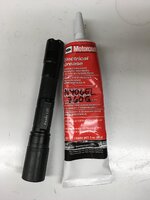Far be it for me (of all people) to participate in the proliferation of yet another thread about O-rings, lubricants, and chemistry (none of which are not in my wheelhouse at all), but there is an electrical element to some terminology here, and that's dead center of my wheelhouse.
The grease that is optimized for and commonly used in automotive multi-pin connectors, is called 'dielectric grease' for a good reason, because in addition to its properties to inhibit water / moisture ingress and guard against resultant corrosion, it's other essential property is just that: it is dielectric because of its NON-conductive properties, which is also optimal for such multi-pin electrical connectors in difficult environmental conditions.
What I use on flashlight O-rings is going to inevitably also be found on my threaded, conducting electrical connections, where 2 flashlight components join, and where if anything, conductivity is essential, and something which would enhance conductivity would, if anything, be a positive (the opposite of 'dielectric'). I'm primarily concerned with the lubrication and health of my O-rings and not necessarily enhancing conductivity, but neither would I want insulating properties. That property might be considered opposite of / counter to my objectives in this particular application.
Just sayin'.
I'm not sure anyone has specifically pointed this out, although I freely admit I've never read the zillion pages of the thread I referred to OP to. That might exceed my current life expectancy.


